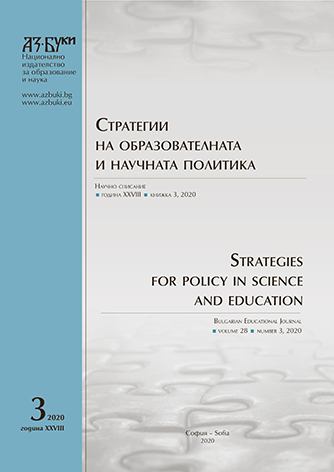Inclusive Education in Pre-University Education in Romania a Case Study: The Eduform Project
Inclusive Education in Pre-University Education in Romania a Case Study: The Eduform Project
Author(s): Roxana ŞtefănescuSubject(s): Social Sciences, Education, Sociology, School education, History of Education, State/Government and Education, Social development, Social differentiation, Family and social welfare, Sociology of the arts, business, education, Economic development, Inclusive Education / Inclusion, Sociology of Education
Published by: Национално издателство за образование и наука „Аз-буки“
Keywords: inclusive education; disadvantaged schools; continuing vocational training; education for all; risk of social isolation
Summary/Abstract: The first part of the paper presents the concept of inclusive education, its evolution and the main international and Romanian approaches that are the basis of the process of transition from exclusion to inclusion in schools. The paper starts from the premise that the classroom teaching staff have a fundamental role in the process of inclusion, being responsible for the education of all the students. The attitude of teaching staff towards the inclusive education depends on their experience, their initial training and the existence of some forms of support in the classroom. In order to meet the need of qualified teaching staff and support staff in the pre-university education, from disadvantaged schools, to be transformed into inclusive schools, it was initiated by the “Spiru Haret National Society for Education, Science and Culture” (SNSH) in partnership with the Mehedinți and Caraș-Sever in County Inspectorates, the inclusive quality EDUcation project through lifelong professional training with the acronym EduForm, a project financed by the European Union. The training programmes developed through this project are designed so that the skills acquired by the trained persons become adaptable for the inclusion of all students in the mass education. Among the achievements of this project is the fact that the activities that will be developed by teaching staff, the support staff and school managers through the project,will lead, in the future, to change the mentality regarding the students in vulnerable situations. A viable school-parent-community partnership will be created, teaching staff will be increasingly involved in activities with children, and local authorities will be closer to schools seeing the improvement of the school situation of students and the quality of education implemented in these and will support through various ways, in the future, these schools.
Journal: Стратегии на образователната и научната политика
- Issue Year: 28/2020
- Issue No: 3
- Page Range: 261-272
- Page Count: 13
- Language: English
- Content File-PDF

